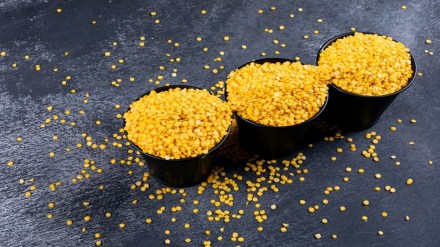Mandi prices for pulses and oilseeds continue to trade below the minimum support price (MSP) as kharif crop arrivals pick up across key markets, traders said. Prices of major pulses varieties—including tur, urad, chana, and masoor—are currently 8–18% below MSP, while oilseeds such as soybean and groundnut are 21–30% below the benchmark prices. Prices remain well below the benchmark despite official assurances of procurement from farmers.
Traders attributed the weak mandi prices to strong kharif crop prospects, adequate import volumes, and sufficient stocks held by government agencies. Chana, a rabi or winter crop, remains the exception, trading slightly above MSP levels.
Government agencies are yet to begin procurement of oilseeds and pulses under the Price Support Scheme (PSS), even after receiving approval from the agriculture ministry as there are reports of higher-than-acceptable moisture content in the crops arriving in the market.
So far, the agriculture ministry has approved procurement of pulses—tur, urad, and moong—and oilseeds—soybean and groundnut—in Uttar Pradesh and Gujarat for the kharif 2025-26 season. Total procurement under the PSS at MSP is estimated at more than ₹13,890 crore.
Sources told FE that approvals for procurement from Telangana and Andhra Pradesh are under discussion. Meanwhile, Maharashtra, a major oilseed-producing state, has announced that the farmers’ collective Nafed will begin purchasing soybean at MSP from November 1 under the PSS.
“Due to robust import and adequate buffer with the government agencies, tur mandi prices are likely to be depressed in the coming months,” Nitin Kalantri, CEO of Latur-based pulses trader and processor Kalantri Food Products, told FE.
Kalantri said the government has to step up purchase of tur in the current season (2025-26), with arrivals expected to commence by early December.
To protect oilseeds farmers against fall in mandi prices, Madhya Pradesh has commenced a price deficiency support scheme — Bhavantar– for soyabean farmers on Friday.
Under the scheme, the state government will compensate over 0.6 million farmers in the state by paying the difference between the prevailing (lower) market price and the minimum support price (MSP) to farmers.
This will be the second attempt by Madhya Pradesh to initiate the price deficit payment scheme (PDPS) or Bhavantar scheme aimed at ensuring that farmers get the MSP while the commodity is sold in the market as usual practice.
The coverage under the PDPS for oilseeds farmers has been enhanced from existing 25% of the production of the state to 40% of the oilseed variety by the agriculture ministry.
Under the scheme, the Centre would reimburse the price difference between the MSP and the selling or modal price in notified market up to 15% of MSP value to the state.
